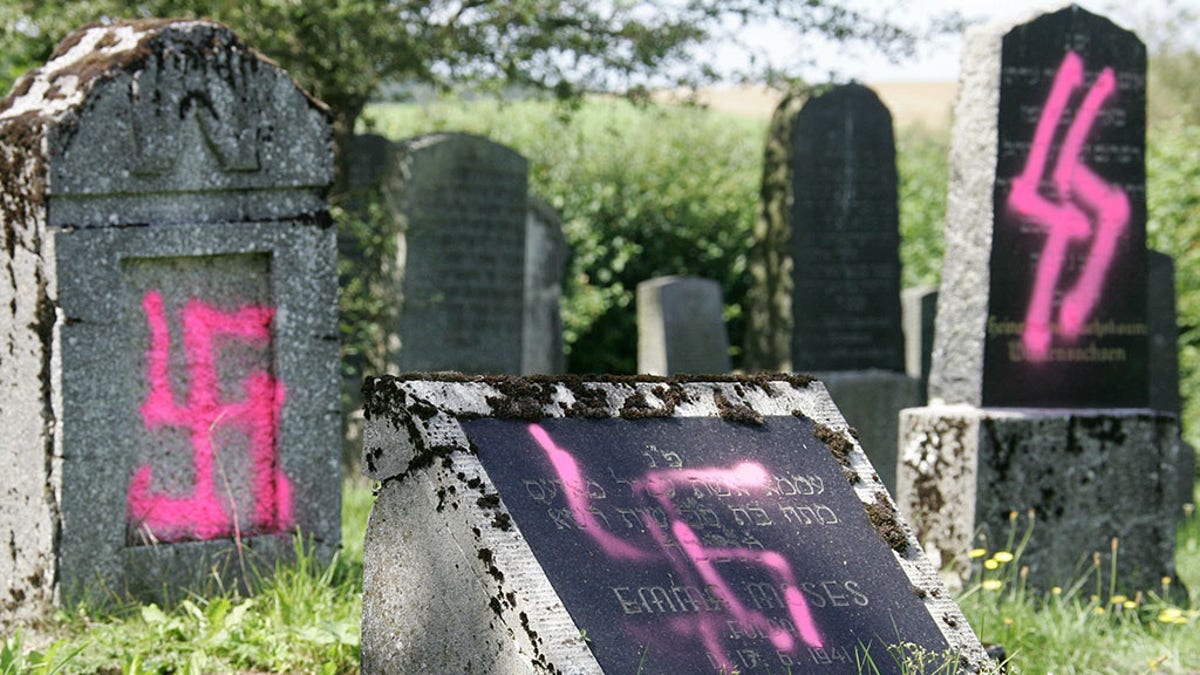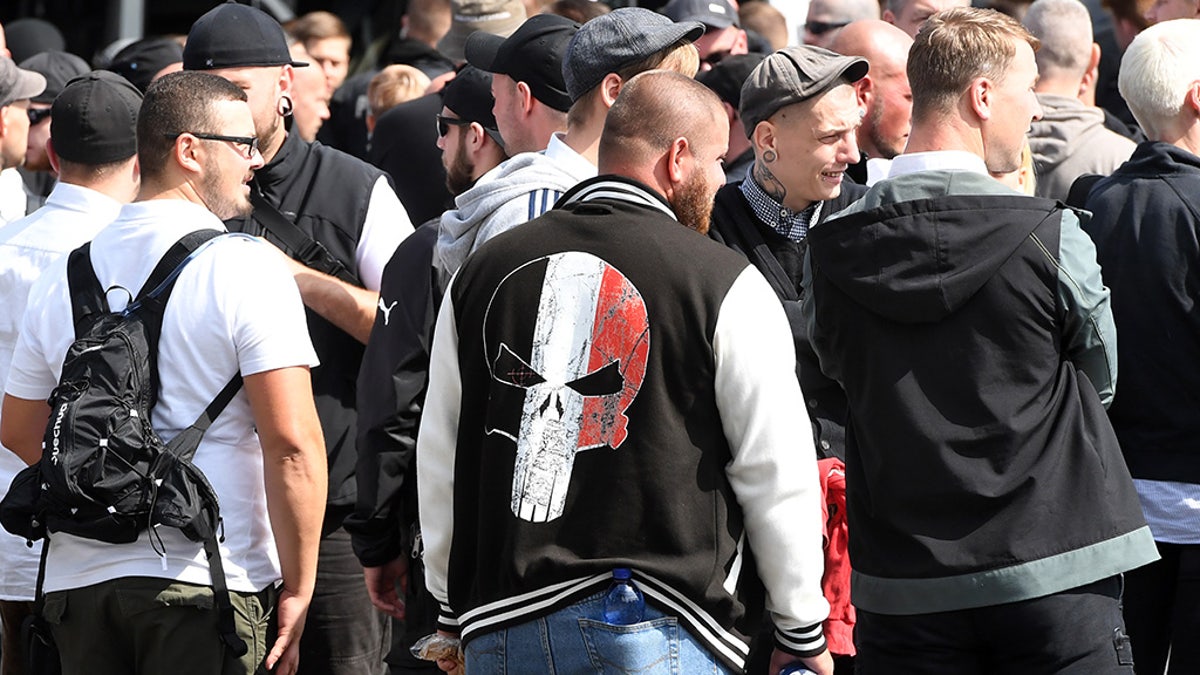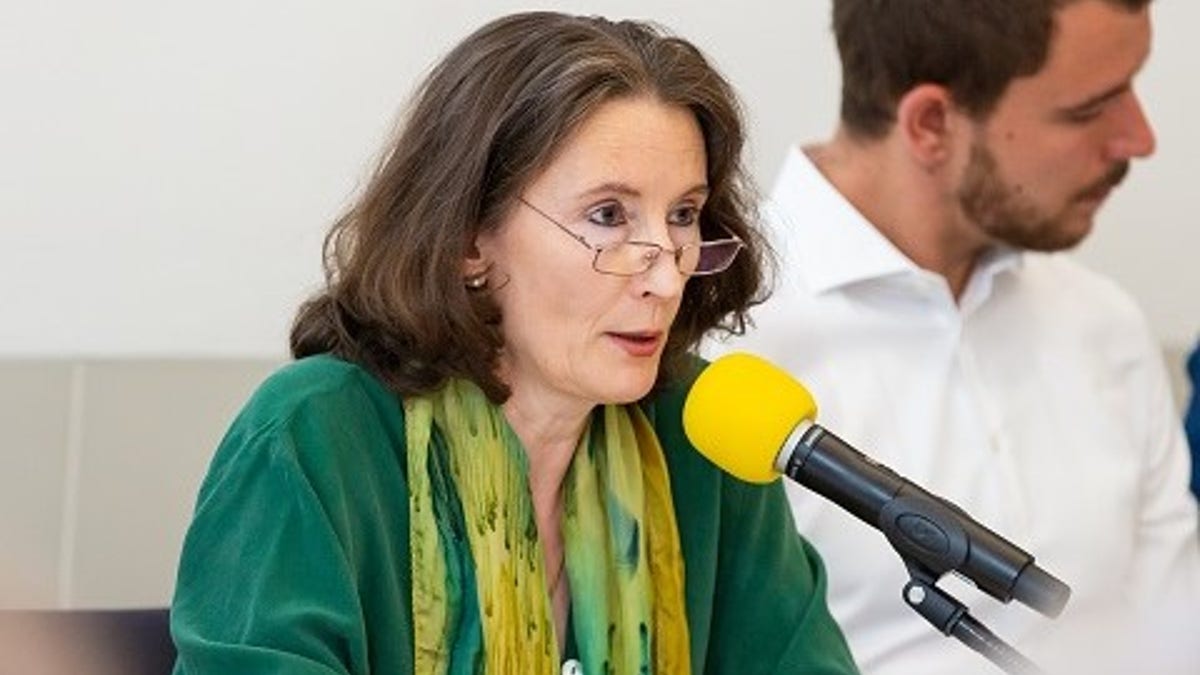
Graves desecrated by vandals with Nazi swastikas and anti-semitic slogans are pictured in the Jewish cemetery of Weyhers, near the city of Ebersburg, Germany (Reuters)
Israeli restaurant owner, Yorai Feinberg, felt welcome in Berlin.
Then he began to receive dozens of anti-Semitic hate emails.
“Jews will land in gas chambers,” they said. The emails were all signed “Ludwig Fischer,” the pseudonym of one of Hitler’s most notorious Nazi henchmen.
Feinberg is one of the many victims of surging anti-Semitism in Germany.
In June, a Jewish high school student at Berlin’s low-crime Friedenauer district was bullied, with swastikas left on his desk. He was subjected to a mock execution. His parents transferred him to a Jewish school.
Weeks later, 16 pre-schools and day care centers in Munich received letters with swastikas and threats against the children, calling them “biological waste.”
Anti-Semitic content on the Internet has jumped from 7.5 percent to over 30 percent in the decade between 2007 and 2018, according to a newly released study by Monica Schwarz-Friesel, a professor of cognitive science at the Technical University in Berlin and an expert on anti-Semitism. The study shows that anti-Semitism permeates mainstream German society.

Far-Right extremists gather to commemorate the 30th anniversary of the death of Adolf Hitler's deputy, Rudolf Hess, in Berlin, August 2017 (Getty)
“For the first time in modern anti-Semitism research our study gives empirical evidence that anti-Semitism is on the rise,” Schwarz-Friesel said in an email.
She said the study demonstrates the extent to which anti-Semitism is spreading on the Internet. It can be seen, heard, and read everywhere online, she said, and this leads to normalization.
“Anti-Semitism is ubiquitous in online communication,” said Schwarz-Friesel. “It has increased and intensified and provides links to photos, texts, songs, and films.”

Monica Schwarz-Friesel Pictured), a professor of cognitive science at the Technical University in Berlin and an expert on anti-Semitism (Monica Schwarz-Friesel)
According to the study, traditional hostility toward Jews remains the primary basis for today’s anti-Semitism. It has always been there, but now it shows its face more openly. Daily online communications contain remarks such as these: “Why are Jews always so mean? I hate Jews so very much.”
POLISH PRIEST SET FOR SAINTHOOD CRITICIZED FOR ANTI-SEMITISM
These are comments from everyday online communications, not from extremist pages, or blogs.
According to the German Interior Ministry’s survey of police reports, there were 1,453 anti-Semitic incidents in 2017, amounting to four a day.
Why these brazen displays of anti-Semitism in the country responsible for the Holocaust?
Remembrance of the Nazi period is fading away, said Richard Herzinger, a columnist for Die Welt, a center-right newspaper in Berlin. "Young people don’t know, or care, about this period", he said. "They ask: 'Why do Jews always impose the Jewish narrative of Holocaust memory on us? Germans suffered too. Why do we always have to hear the Jewish narrative?'"
Attacks on Israel have become a vehicle for expressions of anti-Semitism that might otherwise be socially unacceptable.
MILLIONS OF TWEETS SPREAD ANTI-SEMITIC MESSAGES, REPORT SAYS
“It is of great concern that virtually all anti-Semitic stereotypes are projected in various ways onto discussions of Israel,” said Deidre Berger, director of the American Jewish Committee’s Berlin office. This expression of anti-Semitic hate speech substitutes terms like “Zionists” and “influential circles” for Jewish targets, said Berger.
Xenophobic expressions of hatred against both Jews and Muslims have gained legitimacy with the rise of the ultra-nationalist party, Alternative for Germany (AFD), in the 2017 election.
Anti-Semitism and racism find a voice in this right wing, populist party, that condemns German contrition for its Nazi past and decries the proliferation of Holocaust memorials.
While the AFD had previous failed to gain the five percent necessary to be represented in the Bundestag elections, experts agree Chancellor Angela Merkel’s decision to admit 1.5 million refugees in 2015-16 increased anger at home.
As a result, AFD saw 92 representatives elected in the 2017 national vote and it is now the largest opposition party in the Bundestag.
Merkel’s Christian Democratic government is vehement in its opposition to the rising anti-Semitism. Merkel has appointed a cabinet level tsar to coordinate a national fight against anti-Semitism.
To the far right ultra-nationalists, however, Merkel is seen as a puppet of a hidden Jewish conspiracy against the German people because of her support for the refugees.
“Who could have imagined that more than 70 years after World War II, Holocaust revisionism and even denial would be on the rise, as this study powerfully demonstrates,” said Berger.
